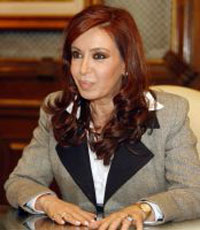Husband-wife transfer of power:Cristina Fernandez sworn in as Argentina's president
Cristina Fernandez is sworn in as Argentina's first elected female president on Monday, taking the reins of government from her husband’s hands. People hope that she will continue the process of recovery after an economic crisis.

Half a decade after the near-total financial blowout, which her husband and current President Nestor Kirchner has called an "economic hell," Fernandez embarks on a four-year term challenged with prolonging a recovery that has seen annual growth rates above 8 percent.
"The government that is coming is going to be much better than the one that's now leaving," Kirchner said recently. He is poised to hand the presidential sash Monday to Fernandez, a three-term senator who won office handily on their left-leaning Victory Front coalition ticket.
Approval ratings topping 60 percent for Kirchner's performance have been largely credited with Fernandez's victory, although she has been praised by some for an astute, unorthodox campaign. Refusing to debate any of her rivals and granting few interviews, Fernandez preferred to be photographed overseas meeting world leaders - projecting a flair for international diplomacy while masking a lack of executive branch experience.
Along the way she drew comparisons to U.S. Democratic candidate Hillary Clinton; both are powerful senators who accompanied their small-state governor husbands to the presidency before launching their own bids for their nations' highest office.
Fernandez joins Michelle Bachelet in neighboring Chile as the second sitting female president in South America, after capturing 45 percent of the ballot against a divided opposition Oct. 28.
Internationally, Fernandez seems unlikely to alter Kirchner's alliance with Latin American leftists, including Venezuelan President Hugo Chavez, but could forge better ties with the next U.S. president
At home, the new president will try to correct some lingering headaches from the Kirchner term: inflation that private economists estimate in the double digits, corruption scandals and a sputtering energy crisis. Unemployment is mired at near 10 percent, poverty snares a quarter of the 39 million populace and Kirchner's administration has been accused of fudging inflation figures to make the economy appear better than it is.
"Hard tasks await Cristina," Kirchner acknowledged.
But he says he's handing Fernandez a country that has returned to "nearly normal" from the 2001-2002 crisis, which saw a steep devaluation of the peso and a US$100 billion ( EUR 68 billion) debt default.
Kirchner renegotiated payment on the debt, and the recovery blunted memories of hungry people scavenging for food in trash bins and depositors hammering on bank doors after losing savings overnight.
Sustaining recovery will be a priority for Fernandez, but unions demanding salary hikes will challenge the government and sporadic energy shortages could hamper growth, according to Argentine analyst Rosendo Fraga.
"Her political challenge will be to avoid the inevitable wear and tear that a second term usually entails," Fraga said.
Riordan Roett, director of Western Hemisphere studies at SAIS-Johns Hopkins University, said the nation has benefited from a benign global economy and booming export tax revenues amid soaring grain prices.
"If there is a slowdown anywhere, she will pay the price," he warned.
Argentina's first female president was Isabel Peron, the second wife of former strongman Juan Peron. She assumed power when he died in 1974, and was ousted by a coup after 20 months in office.
Subscribe to Pravda.Ru Telegram channel, Facebook, RSS!


